- Home
- Kate DiCamillo
Raymie Nightingale Page 2
Raymie Nightingale Read online
Page 2
“I hate Little Miss contests,” said Beverly. “I hate bows and ribbons and batons and all of it. I hate spangly things. My mother has entered me into every Little Miss contest there ever was, and I’m tired of it. And that is why I’m going to sabotage this one.”
“But there’s one thousand nine hundred and seventy-five dollars to win,” said Louisiana. “That is a king’s ransom. That’s an untold fortune! Do you know how much tuna fish you can buy for one thousand nine hundred and seventy-five dollars?”
“No,” said Beverly. “And I don’t care.”
“Tuna fish is very high in protein,” said Louisiana. “In the county home, they only serve you bologna sandwiches. Bologna is not good for people with swampy lungs.”
This conversation was interrupted by a loud noise. A station wagon with wood paneling on its side was coming toward Ida Nee’s circular driveway very fast. The driver’s-side back door of the station wagon was partially unhinged; it was swinging open and then slamming shut again.
“Here is Granny,” said Louisiana.
“Where?” said Raymie.
Because it truly did not appear that anybody was driving the car. It was like the headless horseman, only with a station wagon instead of a horse.
And then Raymie saw two hands on the steering wheel, and just as the station wagon pulled into the driveway, spraying gravel and dust, a voice called out, “Louisiana Elefante, get into the car!”
“I have to go now,” said Louisiana.
“It sure seems that way,” said Beverly.
“It was nice to meet you,” said Raymie.
“Hurry!” shouted the voice from inside the station wagon. “Marsha Jean is somewhere close behind. I’m certain of it. I can feel her malevolent presence.”
“Oh, my goodness,” said Louisiana. She got in the backseat and tried to pull the broken door closed. “If Marsha Jean shows up,” she shouted at Raymie and Beverly, “tell her you haven’t seen me. Don’t allow her to write anything down on her clipboard. And tell her that you don’t know my whereabouts.”
“We don’t know your whereabouts,” said Beverly.
“Who is Marsha Jean?” asked Raymie.
“Quit asking her questions,” said Beverly. “It just gives her an excuse to make up a story.”
The station wagon shot forward. The back door swung open, then shut with a loud bang and stayed closed. The car accelerated at an alarming rate, the engine roaring and groaning, and then the station wagon disappeared entirely, and Raymie and Beverly were left standing together in a cloud that was composed of dust and gravel and exhaust.
Phhhhtttt, as Mrs. Borkowski would say.
Phhhhtttt.
“They seem like criminals to me,” said Beverly. “That girl and her almost-invisible granny. They remind me of Bonnie and Clyde.”
Raymie nodded, even though Louisiana and her grandmother did not remind her of anyone else she had ever seen or heard of.
“Do you even know who Bonnie and Clyde were?” asked Beverly.
“Bank robbers?” said Raymie.
“That’s right,” said Beverly. “Criminals. Those two look like they could rob a bank. And what kind of name is Louisiana, anyway? Louisiana is the name of a state. It’s not what you call a person. That girl is probably operating under an assumed name. She’s probably running from the law. That’s why she seems so afraid in that rabbity kind of way. I tell you what: Fear is a big waste of time. I’m not afraid of anything.”
Beverly threw her baton up high in the air and caught it with a professional snap of her wrist.
Raymie felt her heart clench in disbelief.
“You already know how to twirl a baton,” she said.
“So what?” said Beverly.
“Why are you even taking lessons?”
“I guess that is exactly none of your business. Why are you taking lessons?”
“Because I need to win the contest.”
“I told you,” said Beverly, “there’s not going to be a contest. Not if I can help it. I’ve got all kinds of sabotaging skills. Right now, I’m reading a book on safecracking that was written by a criminal named J. Frederick Murphy. Ever heard of him?”
Raymie shook her head.
“Didn’t think so,” said Beverly. “My dad gave me the book. He knows all the criminal ways. I’m teaching myself how to crack a safe.”
“Isn’t your father a cop?” asked Raymie.
“Yeah,” said Beverly. “He is. What’s your point? I can already pick a lock. Have you ever picked a lock?”
“No,” said Raymie.
“Didn’t think so,” said Beverly again.
She threw the baton up in the air and caught it in her grubby hand. She made twirling a baton look easy and impossible at the same time.
It was terrible to behold.
Suddenly, everything seemed pointless.
Raymie’s plan to bring her father home wasn’t much of a plan at all. What was she doing? She didn’t know. She was alone, lost, cast adrift.
I’m sorry I betrayed you.
Phhhhtttt.
Sabotage.
“Aren’t you afraid that you’ll get caught?” said Raymie to Beverly.
“I told you already,” said Beverly. “I’m not afraid of anything.”
“Nothing?” asked Raymie.
“Nothing,” said Beverly. She stared at Raymie so hard that her face changed. Her eyes glowed.
“Tell me a secret,” whispered Beverly.
“What?” said Raymie.
Beverly looked away from Raymie. She shrugged. She threw the baton up and caught it and then threw it back in the air again. And while the baton was suspended between the sky and the gravel, Beverly said, “I told you to tell me a secret.”
Beverly caught the baton. She looked at Raymie.
And who knows why?
Raymie told her.
She said, “My father ran away with a dental hygienist. He left in the middle of the night.”
This was not necessarily a secret, but the words were terrible and true and it hurt to say them.
“People are doing that pathetic kind of thing all the time,” said Beverly. “Creeping down hallways in the dark with their shoes in their hand, leaving without telling anyone good-bye.”
Raymie didn’t know if her father had crept down the hallway with his shoes in his hand, but he had certainly left without telling her good-bye. Considering this fact, she felt a pang of something. What was it? Outrage? Disbelief? Sorrow?
“It makes me really, really mad,” said Beverly.
She took her baton and started beating the rubber tip of it into the gravel of the driveway. Small rocks leaped up in the air, desperate to escape Beverly’s wrath.
Wham, wham, wham.
Beverly beat the gravel, and Raymie looked on in admiration and fear. She had never seen anyone so angry.
There was a lot of dust.
A car painted a brilliant, glittering blue appeared on the horizon and pulled into the driveway and coasted to a stop.
Beverly ignored the car.
She kept beating the gravel.
It didn’t look like she intended to stop until she had reduced the whole world to dust.
“Stop that!” shouted the woman behind the wheel of the car.
Beverly did not stop. She kept whamming away.
“I paid good money for that baton,” the woman said to Raymie. “Make her stop.”
“Me?” said Raymie.
“Yes, you,” said the woman. “Who else is standing here besides you? Get that baton away from her.”
The woman had green eye shadow on her eyelids and big, fake eyelashes and also a lot of rouge on her cheeks. But underneath the rouge and the eye shadow and the fake eyelashes, she looked very familiar. She looked like Beverly Tapinski, except older. And angrier. If that was possible.
“Why do I have to do everything?” said the woman.
This was the kind of question that had no answer, the k
ind of question that adults seemed to be overly fond of asking.
Before Raymie could even attempt some sort of response, the woman was out of the car and had hold of Beverly’s baton and was pulling on it and Beverly was pulling back.
More dust rose up in the air.
“Let go,” said Beverly.
“You let go,” said the woman, who was surely Beverly’s mother, even though she wasn’t really acting like a mother.
“Stop this nonsense immediately!”
This command issued from Ida Nee, who had appeared out of nowhere and who was standing in front of them with her white boots glowing and her baton stretched out in front of her like a sword. She looked like an avenging angel in a Sunday-school storybook.
Beverly and the woman stopped wrestling.
“What is going on here, Rhonda?” said Ida Nee.
“Nothing,” said the woman.
“Can’t you control your daughter?” said Ida Nee.
“She started it,” said Beverly.
“Get out of here, both of you,” said Ida Nee. She pointed her baton at the car. “And don’t come back until you can behave properly. You should be ashamed of yourself, Rhonda, a champion twirler like you.”
Beverly got in the back of the car, and her mother got in the front. They both slammed their doors at the same time.
“See you tomorrow,” said Raymie as the car pulled out of the driveway.
“Ha!” said Beverly. “You’re never going to see me again.”
For some reason, these words felt like a punch to the stomach. They felt like someone sneaking down a hallway in the middle of the night, carrying their shoes in their hand — leaving without saying good-bye.
Raymie turned away from the car and looked at Ida Nee, who shook her head, marched past Raymie, and went into her baton-twirling office (which was really just a garage) and closed the door.
Raymie’s soul was not a tent. It was not even a pebble.
Her soul, it seemed, had disappeared entirely.
After a long time, or what seemed like a long time, Raymie’s mother arrived.
“How were the lessons?” she asked when Raymie got in the car.
“Complicated,” said Raymie.
“Everything is complicated,” said her mother. “I can’t even begin to imagine why you would want to learn how to twirl a baton. Last summer, it was the lifesaving lessons. This summer, it’s twirling. None of it makes any sense to me.”
Raymie looked down at the baton in her lap. I have a plan, she wanted to say. And the baton twirling is part of the plan. She closed her eyes and imagined her father in a booth, in a diner, sitting across from Lee Ann Dickerson.
She imagined her father opening the paper and discovering that she was Little Miss Central Florida Tire. Wouldn’t he be impressed? Wouldn’t he want to come home immediately? And wouldn’t Lee Ann Dickerson be amazed and jealous?
“What could your father possibly see in that woman?” said Raymie’s mother, almost as if she knew what Raymie was thinking. “What could he see in her?”
Raymie added this question to the list of impossible, unanswerable questions that adults seemed inclined to ask her.
She thought about Mr. Staphopoulos, her lifesaving coach from the summer before. He was not the kind of man who asked questions that didn’t have answers.
Mr. Staphopoulos only ever asked one question: “Are you going to be a problem causer or a problem solver?”
And the answer was obvious.
You had to be a problem solver.
Mr. Staphopoulos had fur on his toes and fur all down his back. He wore a silver whistle around his neck. Raymie didn’t think that he ever took the whistle off.
Mr. Staphopoulos was very passionate about people not drowning.
“Land is an afterthought, people!” That was what Mr. Staphopoulos said to all his Lifesaving 101 students. “The world is made of water, and drowning is an ever-present danger. We must help each other. Let’s be problem solvers together.”
Then Mr. Staphopoulos would blow his whistle, throw Edgar in the water, and the lifesaving lesson would begin.
Edgar was the drowning dummy. He was five feet three inches tall. He was dressed in jeans and a checked button-down shirt. He had buttons for eyes, and his smile was drawn on with a red permanent marker. He was stuffed with cotton that never dried out properly, and there were stones sewn into his hands and feet and stomach so that he would sink. He smelled of mildew — a sweet, sad kind of smell.
Mr. Staphopoulos had made Edgar. He had designed him to drown.
It seemed like a strange reason to be called into the world — to drown, to be saved, to drown again.
It also seemed strange to Raymie that Edgar was doomed to smile through the whole thing.
If she had made Edgar, she would have put a more quizzical look on his face.
But in any case, Edgar and Mr. Staphopoulos were both gone now. They had moved to North Carolina at the end of last summer.
Raymie had seen them in the parking lot of the Tag and Bag Grocery the day they left. All of Mr. Staphopoulos’s belongings were packed into his station wagon, and some things were even tied on top. Edgar was sitting in the backseat, staring straight ahead. He was smiling, of course. Mr. Staphopoulos was just getting into the car.
Raymie called out, “Good-bye, Mr. Staphopoulos.”
“Raymie,” he said, turning around. “Raymie Clarke.” He closed the door of the station wagon and walked toward her. He put his hand on her head.
It was hot in the Tag and Bag parking lot. There were seagulls whirling and screeching, and Mr. Staphopoulos’s hand on top of her head was heavy and light at the same time.
Mr. Staphopoulos was wearing khaki pants and flip-flops. Raymie could see the fur on his feet. The whistle was around his neck, and the sun reflected off of it and made the whistle into a little circle of light. It looked like something in the center of Mr. Staphopoulos was on fire.
The sun glinted off the abandoned grocery carts and made them magical, beautiful. Everything shimmered. The seagulls called out. Raymie thought that something wonderful was going to happen.
But nothing happened except that Mr. Staphopoulos kept his hand on her head for what seemed like a long time, and then he lifted his hand and squeezed her shoulder and said, “Good-bye, Raymie.”
Just that.
“Good-bye, Raymie.”
Why did those words matter so much?
Raymie didn’t know.
At home, after the very strange baton-twirling class, Raymie sat in her room with the door closed and worked on the Little Miss Central Florida Tire application. It was a two-page, mimeographed form, and it was obvious that Mr. Pitt, the owner of Central Florida Tire, had typed the form himself. He was not a very good typist. The application was full of errors, which for some reason made the whole enterprise (the contest and the hope that Raymie would win it and the further hope that winning it would bring her father home) seem dubious.
The first question was in all-capital letters. It said: DO YOU WANT TO BECOME LITTLE MISS CENTRAL FLORIDA TIRE 1975?
There was no space for an answer to this question; still, it was a question and Raymie felt like it would be best to answer it, since the application said, “Make sure yu answer ALL Questions.”
Raymie squeezed in the word YES right after the question mark. She used all-capital letters. She thought about adding an exclamation mark, but decided against it.
And then she filled in her name: Raymie Clarke.
And her address: 1213 Borton Street, Lister, Fla.
And then her age: 10.
She wondered if Louisiana and Beverly were sitting in their rooms filling out their applications. Did you have to fill out an application for a contest if you intended to sabotage the contest?
Raymie closed her eyes and saw Louisiana writing the words “The Flying Elefantes” in the air with her baton. How could Raymie compete against somebody from a show-business background?
Raymie opened her eyes and looked out the window. Old Mrs. Borkowski was sitting in a lawn chair in the middle of the road. Her shoes were untied. Her face was lifted up to the sun.
Raymie’s mother said that Mrs. Borkowski was as crazy as a loon.
Raymie didn’t know if this was true or not. But it seemed to her that Mrs. Borkowski knew things, important things. Some of the things she knew, she told. And some of the things she knew, she refused to tell, saying nothing but “Phhhhtttt” when Raymie asked for more information.
Old Mrs. Borkowski probably knew who the Flying Elefantes were.
Raymie looked back down at the application. It said, “Please list all of your GOOD DEEdS. Use a separate sheet of paper if necessary.”
Good deeds? What good deeds?
Raymie’s stomach clenched. She got up from the desk and left her room and went out the front door and walked into the middle of the street. She stood in front of Mrs. Borkowski’s lawn chair.
“What?” said Mrs. Borkowski without opening her eyes.
“I’m filling out an application,” said Raymie.
“Yes, and so?”
“I’m supposed to do good deeds,” said Raymie.
“One time,” said Mrs. Borkowski. She smacked her lips. Her eyes were still closed. “One time a something happened.”
Obviously, Mrs. Borkowski intended to tell a story. Raymie sat down in the middle of the road at Mrs. Borkowski’s feet. The pavement was warm. She looked at Mrs. Borkowski’s untied shoes.
Mrs. Borkowski never tied her shoes.
She was too old to reach her feet.
“One time a something happened,” said Mrs. Borkowski again. “I was on a boat at sea, and I saw a baby get snatched from his mother’s arms. By a bird. A gigantic seabird.”
“Is this a story about a good deed?” asked Raymie.
“It was terrible, how the mother screamed.”
“But the mother got the baby back, right?”
“From a gigantic seabird? Never,” said Mrs. Borkowski. “Those gigantic seabirds, they keep what they take. Also, they steal buttons. And hairpins.” Mrs. Borkowski lowered her head and opened her eyes and looked at Raymie. She blinked. Mrs. Borkowski had very sad, extremely watery eyes. “The wings of the seabird were huge. They looked like they belonged to an angel.”

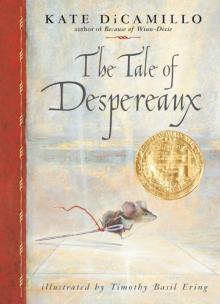 The Tale of Despereaux
The Tale of Despereaux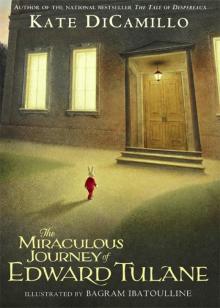 The Miraculous Journey of Edward Tulane
The Miraculous Journey of Edward Tulane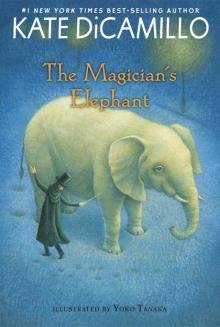 The Magician's Elephant
The Magician's Elephant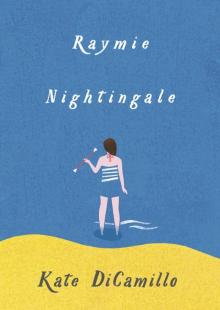 Raymie Nightingale
Raymie Nightingale Because of Winn-Dixie
Because of Winn-Dixie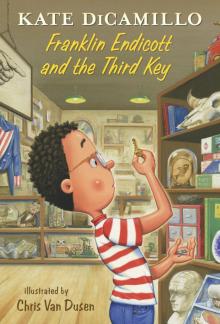 Franklin Endicott and the Third Key
Franklin Endicott and the Third Key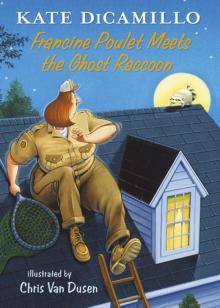 Francine Poulet Meets the Ghost Raccoon
Francine Poulet Meets the Ghost Raccoon Where Are You Going, Baby Lincoln?
Where Are You Going, Baby Lincoln? Flora & Ulysses: The Illuminated Adventures
Flora & Ulysses: The Illuminated Adventures Beverly, Right Here
Beverly, Right Here Eugenia Lincoln and the Unexpected Package
Eugenia Lincoln and the Unexpected Package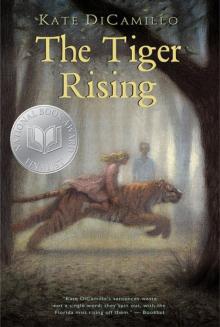 The Tiger Rising
The Tiger Rising The Beatryce Prophecy
The Beatryce Prophecy Leroy Ninker Saddles Up
Leroy Ninker Saddles Up